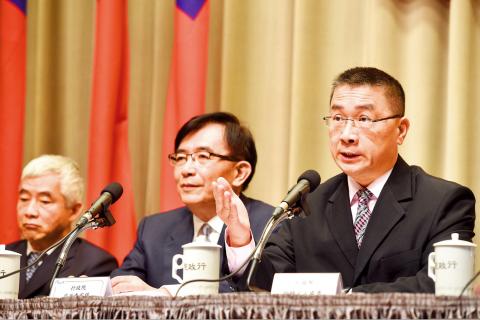The Forward-looking Infrastructure Development Program draft bill review should be held again, the legislature’s Economics Committee convenor said yesterday, adding that there were flaws in her chairing of Wednesday’s review, which passed the bill amid chaos.
The convenor, Democratic Progressive Party (DPP) Legislator Chiu Yi-ying (邱議瑩), said she would reschedule the review for Monday, Wednesday and Thursday next week to allow for detailed, clause-by-clause deliberation.
“I am willing to take responsibility and rearrange the review. Can lawmakers of the opposition party give up hatred, restart conversations, keep their promise to not disrupt the procedure and make efforts to improve the nation’s infrastructure?” Chiu asked, calling on the Chinese Nationalist Party (KMT) not to boycott the draft bill.

Photo: Peter Lo, Taipei Times
She said the DPP did not boycott a four-year NT$500 billion (US$16.6 billion) economic stimulus project proposed by then-president Ma Ying-jeou (馬英九) in 2008, which allowed the project to be approved within a month.
KMT caucus convener Sufin Siluko (廖國棟) said the new review is “acceptable, as it is precisely our call,” but demanded a formal decision be announced by the legislative speaker or by a cross-caucus meeting, rather than on Facebook.
The New Power Party caucus yesterday morning had already asked Legislative Speaker Su Jia-chyuan (蘇嘉全) to call a cross-caucus negotiation meeting and restart substantive review, and later said it “welcomes” the DPP caucus’ decision.
Su said Chiu’s proposal is “highly commendable” and he expects there would be no boycott or physical altercations during the new review.
Premier Lin Chuan (林全) sought to assuage concerns and drum up support for the infrastructure plan, calling on all parties to put aside preconceived ideas and treat the program in a practical and reasonable manner.
No part of the plan is to be implemented until environmental impact assessments have been carried out, Lin said in response to concerns expressed by environmental groups over some of the proposed transportation projects.
There would also be no major relocation of people or land requisitions, he added.
He made the comments when speaking at a weekly Cabinet meeting, Executive Yuan spokesman Hsu Kuo-yung (徐國勇) said.
Lin addressed these criticisms a day after President Tsai Ing-wen (蔡英文) said the Cabinet was not doing enough to help the public understand the plan.
Lawmakers of the ruling and opposition parties on Wednesday pushed and shoved each other during a joint committee session before the bill passed its preliminary review.
The statute would allow the Cabinet to spend NT$882.49 billion over eight years to build infrastructure projects across the nation, including new light railways and several rail extension or improvement projects.
There will be no question of leaving future generations in debt as a result of the plan, Lin said.
When announcing the plan last month, Lin said that government spending is expected to lead to NT$1.77 trillion in private-sector investment and add 0.7 percent to the nation’s GDP growth each year over the eight-year period.

Chinese Nationalist Party (KMT) Chairman Eric Chu (朱立倫), spokeswoman Yang Chih-yu (楊智伃) and Legislator Hsieh Lung-chieh (謝龍介) would be summoned by police for questioning for leading an illegal assembly on Thursday evening last week, Minister of the Interior Liu Shyh-fang (劉世芳) said today. The three KMT officials led an assembly outside the Taipei City Prosecutors’ Office, a restricted area where public assembly is not allowed, protesting the questioning of several KMT staff and searches of KMT headquarters and offices in a recall petition forgery case. Chu, Yang and Hsieh are all suspected of contravening the Assembly and Parade Act (集會遊行法) by holding

PRAISE: Japanese visitor Takashi Kubota said the Taiwanese temple architecture images showcased in the AI Art Gallery were the most impressive displays he saw Taiwan does not have an official pavilion at the World Expo in Osaka, Japan, because of its diplomatic predicament, but the government-backed Tech World pavilion is drawing interest with its unique recreations of works by Taiwanese artists. The pavilion features an artificial intelligence (AI)-based art gallery showcasing works of famous Taiwanese artists from the Japanese colonial period using innovative technologies. Among its main simulated displays are Eastern gouache paintings by Chen Chin (陳進), Lin Yu-shan (林玉山) and Kuo Hsueh-hu (郭雪湖), who were the three young Taiwanese painters selected for the East Asian Painting exhibition in 1927. Gouache is a water-based

Taiwan would welcome the return of Honduras as a diplomatic ally if its next president decides to make such a move, Minister of Foreign Affairs Lin Chia-lung (林佳龍) said yesterday. “Of course, we would welcome Honduras if they want to restore diplomatic ties with Taiwan after their elections,” Lin said at a meeting of the legislature’s Foreign Affairs and National Defense Committee, when asked to comment on statements made by two of the three Honduran presidential candidates during the presidential campaign in the Central American country. Taiwan is paying close attention to the region as a whole in the wake of a

OFF-TARGET: More than 30,000 participants were expected to take part in the Games next month, but only 6,550 foreign and 19,400 Taiwanese athletes have registered Taipei city councilors yesterday blasted the organizers of next month’s World Masters Games over sudden timetable and venue changes, which they said have caused thousands of participants to back out of the international sporting event, among other organizational issues. They also cited visa delays and political interference by China as reasons many foreign athletes are requesting refunds for the event, to be held from May 17 to 30. Jointly organized by the Taipei and New Taipei City governments, the games have been rocked by numerous controversies since preparations began in 2020. Taipei City Councilor Lin Yen-feng (林延鳳) said yesterday that new measures by